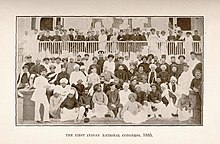కాళి చరణ్ బెనర్జీ
కాళీ చరణ్ బెనర్జీ (1847–1907) కలకత్తా క్రిస్టో సమాజ్ స్థాపకుడు, కలకత్తా న్యాయవాది, భారత జాతీయ కాంగ్రెస్ వ్యవస్థాపక సభ్యుడు.[1][2][3][4] స్కాట్లాండ్ ఫ్రీ చర్చ్ ద్వారా క్రైస్తవ మతంలోకి మారిన బెంగాలీ వ్యక్తి.
కాళి చరణ్ బెనర్జీ | |
|---|---|
 c. 1900 | |
| వ్యక్తిగత వివరాలు | |
| జననం | 1847 జబల్పూర్, మధ్యప్రదేశ్ |
| మరణం | 1907 |
| రాజకీయ పార్టీ | Indian National Congress |
కాంగ్రెస్ నాయకుడు మార్చు

మంచి వక్తగా బెంగాలీ క్రిస్టియన్ కమ్యూనిటీ ప్రతినిధిగా 1885 లో ఇండియన్ నేషనల్ కాంగ్రెస్ (కాంగ్రెస్) లో చేరాడు. జాతీయ ఉద్యమ విధానాన్ని రూపొందించడంలో కాంగ్రెస్ వార్షిక సమావేశాలలో క్రమం తప్పకుండా ప్రసంగించాడు. లాహోర్ నుండి జిసి నాథ్, లక్నో నుండి రామ్ చంద్రబోస్, మద్రాస్ (ప్రస్తుత చెన్నై) నుండి పీటర్ పాల్ పిళ్లైతోపాటు కాళీచరణ్ బెనర్జీ 1888- 1891 మధ్యకాలంలో కాంగ్రెస్ నాలుగు సమావేశాలలో భారతీయ క్రైస్తవులకు ప్రాతినిధ్యం వహించాడు, ఏర్పడిన తొలినాళ్లలో కాంగ్రెస్ ప్రముఖ నాయకుడయ్యాడు.[2][3][5]
కాంగ్రెస్ వార్షిక సమావేశాలలో క్రమం తప్పకుండా పాల్గొనడం ద్వారా, పరిపాలనా సంస్కరణల కోసం కలకత్తాలోని వలసరాజ్య బ్రిటీష్ ప్రభుత్వం ముందు అనేక ప్రతిపాదనలను ఉంచడంలో ప్రభావితం చేయగలిగాడు, విజయం సాధించగలిగాడు. 1889 కాంగ్రెస్ సెషన్లో, విద్యా వ్యవస్థలను, ముఖ్యంగా విశ్వవిద్యాలయ విద్య-ఉన్నత విద్యను మెరుగుపరచాలని డిమాండ్ చేస్తూ తీర్మానానికి బాధ్యత వహించాడు. ఇండియన్ లీగ్ మునిసిపల్ ఎలక్టివ్ సిస్టమ్ ప్రయోజనాల గురించి చర్చించిన గ్రాండ్ మీటింగ్కు కూడా ఆయన అధ్యక్షత వహించాడు - ఇది రిచర్డ్ టెంపుల్ను ఆకర్షించింది.[6][7]
1889లో, కలకత్తాలో కలోనియల్ బ్రిటిష్ రాజ్ విధించిన రాజకీయ ఉద్యమాలలో ఉపాధ్యాయులు పాల్గొనడాన్ని నిషేధించడాన్ని నిరసించడంలో కీలక పాత్ర పోషించాడు.
మూలాలు మార్చు
- ↑ [B.R. Barber, Kali Charan Banurji: Brahmin, Christian, Saint (Madras: Christian Literature Society, 1912), p.20]
- ↑ 2.0 2.1 "Christians and the Indian National Movement: A Historical Perspective" (PDF). biblicalstudies.org.uk. Retrieved 13 May 2012.
In 1887, K. C Banerji and Shome formed the 'Calcutta Christo Samaj' which was a Christian parallel to the Brahmo Samaj
- ↑ 3.0 3.1 "Uncapping the Springs of Localization: Christian Acculturation in South India in the Nineteenth and Twentieth Centuries, by M. Christhu Doss" (PDF). mgutheses.in. Archived from the original (PDF) on 26 December 2011. Retrieved 14 May 2012.
The growing Indian national movement in Bengal, which later came to be called the "Bengal storm"40 by Stephen Neill, made an indelible mark on the intelligentsia of Indian Christianity. For many of the leaders of socio-religious movements, Christianity was closely linked with imperialism, which later resulted in the revival and reassertion of Hinduism in conscious opposition to Christianity.41 Nevertheless, a number of educated Christians, both Indian and foreign theologians including Kali Charan Banerjee, Sathianadhan, K. T. Paul, Vedanayagam Samuel Azariah, Whitehead, C.F. Andrews, Appasamy, Chenchiah, and Vengal Chakkarai, became critical not only of the British raj but of the Western captivity of the Indian church at large.
- ↑ "Rethinking "Rethinking"" (PDF). biblicalstudies.org.uk. Retrieved 14 May 2012.
KaIi Charan Banurji and 1. G Shome, both BengaIis about whom more will be said below under "new church attempts," spoke for a radical change in the way Christianity functioned in India.
- ↑ "Brahmabandhao Upadhyay and Questions of Multiple Identities.George Pattery,s.j." goethals.in. Retrieved 12 May 2012.
Upadhyaya came to know Jesus Christ through Sen and through his own uncle, Reverend Kalicharan Banerji
- ↑ "PICTURES of INDIAN LIFE". Retrieved 13 May 2012.
A grand meeting, to discuss the advantages of the municipal elective system, of the Indian League was held under the presidency of Babu Kali Charan Banerji. The proceedings attracted the notice of his Honour Sir Richard Temple, the then Lieutenant Governor of Bengal. The latter called upon Shishir Babu and asked him it he was willing that the elective system should be introduced in the municipal bodies in the country.
- ↑ "Indian Christian's contribution to the field of Social Work". Retrieved 12 May 2012.
Kali Charan Banerjee, Bengali Christian proposed government administrative reforms through educational system. Swedeshi Movement of 1905 and Non-cooperation movement was supported by Hindu Christians believing "It is not religion but human values and patriotism stands first. Brahma Bandhab Upadhya was in forefront of the movement as leader.